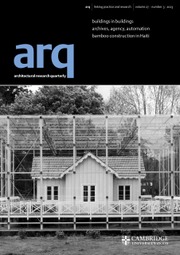Article contents
Wang Shu’s design practice and ecological phenomenology
Published online by Cambridge University Press: 19 February 2019
Extract
Wang Shu (b. 1963) is a locally trained Chinese architect who has received widespread media coverage in the last decade, especially after receiving the prestigious Pritzker Prize in 2012, often considered the Nobel Prize of architecture. Numerous articles and interviews have been published concerning Wang Shu and his design practice, however, there is a lack of analysis of his work from what might be called the perspective of his ecological phenomenology. Wang acknowledges his interest in phenomenological thinking and expresses an ongoing concern about human relationships with place and nature, the continuity of craftsmanship in the face of technological development, as well as the materiality and tactility of bodily perception. Before analysing Wang's work, relevant ideas of Martin Heidegger (1889–1976) and Maurice Merleau-Ponty (1908–1961) and their influence on architectural discourse are firstly examined. Both of them were seminal philosophers who offered inspiring insights to ecological discourse.
- Type
- Theory
- Information
- Copyright
- Copyright © Cambridge University Press 2018
- 6
- Cited by


